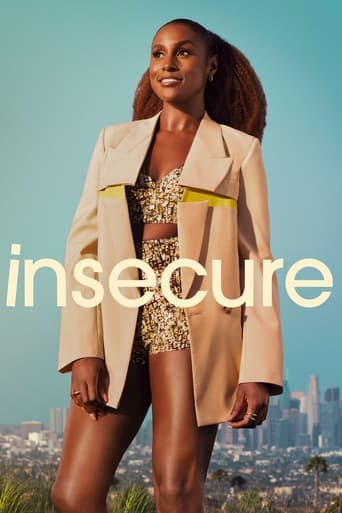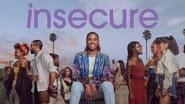ballougirllove
This show speaks to me because being a black woman in my 20's, life can be wild and unexpected. It good to find humor it in.
lollie
I started this series with hesitation, because most shows are unrealistic and provide nothing I can relate to, nor are they funny enough to stick with. I enjoyed Insecure from the beginning, and it got better as it progressed. I'm looking forward to a second season. I'm a white 30's something female, and I can relate more with Molly than I ever could with Sex and The City or Girls (both unrealistic in my opinion). It's refreshing to see a TV series that is not all white, with intelligent humor, and drama that is perfect; I can't stand 'over the top' drama. I can't speak for others, but as a female I can relate to the many issues that Molly and her friend have. I think awards should be given to writing, directing, and acting. Bravo on a great new TV series.
swilliky
I thought we had another episode but the show ended on heartbreak. The trials and tribulations of Issa (Issa Rae) made for some hilarious and great dramatic television on par if not better than typical half-hour HBO comedies. The show explored the life of twenty-somethings struggling for careers and stable relationship and all the awkwardness that comes with the transfer to professional life and dating with the potential of marriage.Issa lives with her boyfriend Lawrence (Jay Ellis) who is can't find a job that fits his education and status and depends on Issa for the bills. Issa works at a non-profit for underserved kids. One of the funniest scenes is at the beginning of the show when the kids pelt Issa with questions about his personal life and she defends herself the best way possible. Their relationship is strained and becomes even more so when Issa encounters an old flame Daniel (Y'lan Noel). After the second season: In one of the more entertaining shows on the most entertaining night on television on the most entertaining channel, Issa Rae returns for a hilarious and awkward season. Issa is newly single and exploring her newfound freedom. Lawrence (Jay Ellis) has to adjust as well staying with his friend Chad (Neil Brown Jr.) on an inflatable mattress. Issa's best friend Molly Carter (Yvonne Orji) has more experience being single but always hopes to have an ideal relationship. Things seem to fall apart for Issa from the first episode and only get worse. She wrecks her car staring at a dick pic, throws a party that gets out of control, and goes on way too many terrible dates through Tinder. In the end, she still feels lonely and tries to seek out the man that helped cause the split with Lawrence, Daniel King (Y'lan Noel). Issa also has trouble at work. Her job to help students after school to learn and do their homework runs into a problem when a vice principal only recommends black students and does not include the Latino students. Her coworker Frieda (Lisa Joyce) sees the problem and wants to change it but Issa shuts her down just excited to have students back in her class. Molly hopes to move up at her law firm but she suspects her bosses judge her by her race as they promote white men. She starts to look around and forms a bond with another lawyer in a Chicago office (LilRel Howery). Lawrence has success at a new job too but finds the developers are just nice to him and don't respect his ideas. He forms a relationship with a coworker Aparna (Jasmine Kaur).Check out more of this review and others at swilliky.com
penelope-35
INSECURE is not quite what I expected. I was ready for a whole lot of Issa Rae but instead I feel as though the "Molly" character is crammed into the story and grabbing important development aspects that rightfully belong to the main character. This unfortunate decision has really narrowed the impact of what should have been a groundbreaking prestige series for HBO. In Awkward Black Girl ("ABG"), Issa Rae's breakthrough online series, the story was narrated n part through Voice Over which is traditionally frowned upon even though it worked well in successful programs like Sex in the City and frankly worked fantastically in ABG. So in order to tell her story in the conventionally "acceptable" fashion the Powers That Be had to cram another Black female, Molly into the story to be her sounding board and foil character. If all the issues in the current plot line were happening to the same person it would be a much more compelling show. But here, the issues are divided between two characters which diminishes their impact. Whose character development are we supposed to be following? There are some implausible moments from the very beginning. Why would an "insecure" person jump up on stage singing about anyone's "pussy". It felt forced and unnatural. And for the sake of all that is holy - Why Is There So Much Cursing? Two intelligent, educated black women sit in a restaurant for lunch having a loud expletive laden conversation that professional black women certainly have in private but NEVER in public. Why would Molly care about someone in her office getting married? Issa's character would be more concerned with that as she has been living with a man who has not been able to get his act together to take that next step. Molly doesn't even have a steady beau, yet. So it seems highly unlikely that someone getting engaged would even resonate with her. Her strong reactions would only seem valid if her office mate was getting engaged to a man that Molly had dated seriously. It makes me very uncomfortable seeing the same angry black woman who can't get a date, who complains about the variety of black men who are in the dating pool; or the black woman who has the disappointing boyfriend, who slacks off at work, who has to be chided by white people as to how to be a concerned employee and involved black person.That scene was extremely condescending. And further, the "fill in the blank - 'As *beep*'" episode titles are puerile and make it difficult to reference them in water- cooler discussions. I believe that Issa Rae is a brilliant writer and really good actress, and I am praying that her very unique voice does not get drowned out by industry-insider conventionalism that has to this point marginalized the ability to bring non-stereotypical and reality-based People of Color to the big and small screens.











